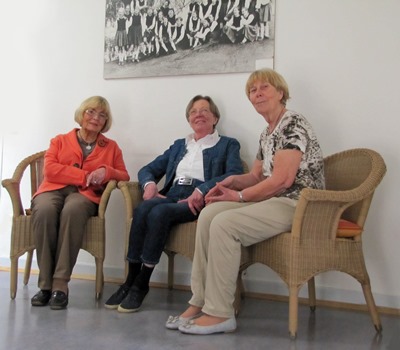
Two members of a German youth choir are to make an emotional return to the town of Llangollen this July, 60 years after they sang there as schoolgirls.
Ursel Gaussman and Inge Volkening, then both aged 14, were part of the Obernkirchen Children’s Choir which won at the Llangollen International Musical Eisteddfod in 1953 – and had an international hit with the song The Happy Wanderer.
Sixty years on the Eisteddfod have contacted the choir, now known as the Schaumburger Maerchensaenger, and invited Inge and Ursel over, accompanied by the choir’s musical director, Gudrun Wuttke.
They will take part in the opening ceremony for this year’s event, on Tuesday, July 9, the first time they have been back to the UK since 1953.
Then another visitor, the poet Dylan Thomas, described them as “pig-tailed angels” in a radio broadcast, one of his last for the BBC before his death in New York four months later.
Ursel and Inge actually met the great poet as well as the Queen and Prince Philip
Gudrun, who has been in charge of the choir for over 25 years, said proudly: “He is one of my favourite poets and we still use ‘angels with pigtails’ in our publicity.
“I have spoken to the ladies and they really want to come back to Llangollen but they wanted me to come with them because they don’t speak English.
“They appeared on a very famous German television show in September and they spoke about their memories of Llangollen and the choir performed the song – it was lovely to see Inge and Ursel singing along.”
The BBC broadcast of the choir performing The Happy Wanderer at Llangollen turned it into an international hit – it was written by Friedrich-Wilhelm Möller whose sister Edith conducted the choir.
She and Florenz Siegesmund wrote the lyrics and within six months it was in the UK charts while the choir became internationally known and toured extensively.
Inge and Ursel married and had families and still live in Obernkirchen and Ursel’s son and two nieces also sang in the choir.
Gudrun added: “When you look at the amazing history of this choir you always should have in mind that Germany lost the war in 1945 and had a very difficult relationship to any other country.
“Up to the early Fifties Schaumburg was British occupation zone. The two founder ladies – Edith Möller and Erna Pielsticker – became friends with the British Relation Officer, and with his great support the amazing story begins.
“He arranged an exchange trip to England, to Ipswich, in 1950 and this contact initiated the participation in the Llangollen Musical Eisteddfod in 1953.
“For Inge and Ursel it was their second trip to Great Britain and their first to Wales and both ladies look back to this still with great excitement.
“They could hardly speak or understand any English and had never been anywhere besides Schaumburg before.
“During their stay in Llangollen they were guests of Welsh families and even the breakfast habits seemed strange for these girls.
“One day the host lady called her young guests for breakfast one morning and ‘Would you please come down for breakfast?’ Inge translated as ‘Willy, es gibt Bratwurst’ – Willy, we are going to have fried sausage’.
“But the memory of both ladies is still vivid and their experience in Llangollen is one of the most important of their lives.
“Both tell me that the choir formed their lives and they still have contacts to people from their time in the choir membership and still meet in the society of former Märchensänger.”
One person who remembers their 1953 performance vividly is former Eisteddfod Chairman Gethin Davies, then a 14-year-old schoolboy just promoted to the sought after job of usher in the Eisteddfod marquee after serving his time as a programme seller.
He said: “I had just shown someone to their eat when these children came on with a double bass and a guitar and suddenly his wonderful sound came over – it sent shivers down my back.
“When they had finished the audience was just lapping and clapping and calling for an encore but because it was a ompetition they couldn’t do one.
“The BBC had recorded it though and arlophone released it as an old-fashioned 78rpm record and it was a big hit.
“I used to listen to it on Radio Luxembourg hich was rather frowned upon by your parents but others recorded it too and hey put some awful English words to it.
“But it was an unforgettable occasion and, as Max Boyce would say, I was there.
“I loved being an usher because after showing people to their seats you could just sit down and enjoy the performances.”
Inge and Ursel are are still going strong in the small town of Obernkirchen, near Minden, in Lower Saxony, where Gudrun is in charge of three choirs from primary school age to 24.
She is also looking forward to the visit and said: “The UK is my favourite country and I have visited many times but never to Llangollen before but we are very much looking forward to it.”
Gethin Davies added: “I would be thrilled if those ladies can make the trip. It would be a real link with my childhood and the treasured memories I have of the Esteddfod.”
The Eisteddfod’s Musical Director, Eilir Owen Griffiths, said: “We are thrilled that they will be here and have made the arrangements to fly them over.
“They are a real link with the Eisteddfod’s history and with its culture and international appeal.”
To watch Inge and Ursel and the present day choir on German TV go to http://www.youtube.com/watch?v=acowt_7fQUU and for more on the choir check out http://www.maerchensaenger.de/
To book tickets and for more details on this year’s event go to the website at www.international-eisteddfod.co.uk and on Facebook at www.facebook.com/llangollen